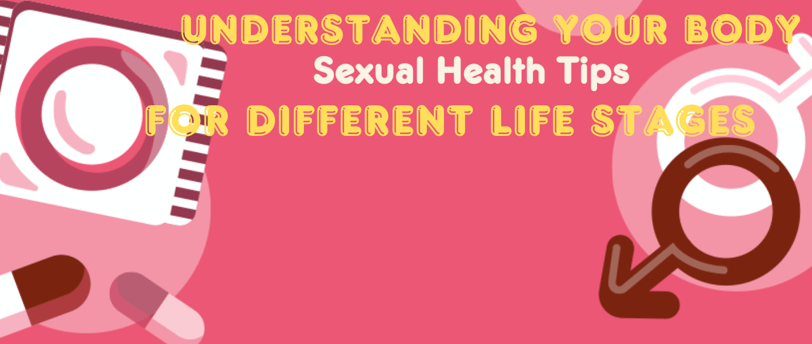Claim your free toy from Lust Collection's grand opening gift!
Understanding Your Body: Sexual Health Tips for Different Life Stages
Sexual health is a dynamic and evolving aspect of life that changes with age and life circumstances. "Understanding Your Body: Sexual Health Tips for Different Life Stages" offers valuable insights and practical advice on how to navigate and maintain sexual health from adolescence through to older adulthood. By understanding how your body and sexual health needs change over time, you can take proactive steps to enhance your well-being at every stage of life.
SEXUAL HEALTH TIPS
Ms. Lusty
8/13/20243 min read


1. Adolescence: Building a Foundation
The teenage years are a time of significant physical and emotional changes. Establishing a healthy foundation for sexual health during this period is crucial.
Educate Yourself: Understanding sexual anatomy, contraception, and STI prevention is essential. Reliable sources such as sexual health education programs and healthcare providers can offer accurate information.
Practice Safe Sex: If you choose to be sexually active, use protection to prevent STIs and unintended pregnancies. Condoms are a key method for reducing these risks.
Seek Guidance: Don’t hesitate to talk to a trusted adult or healthcare provider about sexual health questions or concerns. Open conversations help build knowledge and confidence.
2. Young Adulthood: Exploring and Establishing
In your twenties and early thirties, you may be exploring relationships and establishing sexual patterns. Prioritize these aspects of sexual health:
Focus on Communication: Open dialogue with partners about desires, boundaries, and sexual health is essential. Effective communication enhances mutual understanding and satisfaction.
Regular STI Testing: Stay proactive about sexual health by scheduling regular STI screenings. Testing is a responsible way to monitor your health and that of your partners.
Contraceptive Choices: Explore and choose the contraceptive methods that best fit your lifestyle and health needs. Consult with your healthcare provider to find the most suitable options.
3. Midlife: Navigating Changes
As you enter your forties and fifties, you may experience changes in sexual health due to aging, hormonal shifts, and life changes.
Manage Hormonal Changes: For women, perimenopause and menopause can bring changes in libido, vaginal dryness, and sexual comfort. Hormone replacement therapy (HRT) and lubricants can help manage these symptoms.
Address Erectile Function: For men, age-related changes in erectile function can occur. If you experience difficulties, consult a healthcare provider to explore treatment options and address underlying health issues.
Embrace New Dynamics: Relationship dynamics may shift during this stage. Openly discuss any changes with your partner and explore ways to maintain intimacy and satisfaction.
4. Later Adulthood: Maintaining Vitality
In your sixties and beyond, maintaining sexual health remains important for overall well-being and quality of life.
Prioritize Health: Chronic conditions and medications can impact sexual function. Work with your healthcare provider to manage these factors and discuss any sexual health concerns.
Adapt and Innovate: Sexual expression and activity might evolve with age. Embrace new ways to experience intimacy and pleasure that align with your current physical and emotional state.
Stay Active and Engaged: Regular physical activity and mental engagement contribute to sexual health. Exercise promotes blood flow, energy levels, and overall vitality.
5. Across All Ages: Embracing Emotional Well-Being
Sexual health is not only about physical well-being but also involves emotional and relational aspects that are relevant at any stage of life.
Build Emotional Intimacy: Regardless of age, emotional connection with your partner enhances sexual satisfaction. Foster intimacy through quality time, open communication, and mutual support.
Manage Stress: Stress and mental health can impact sexual health. Incorporate stress-reducing practices such as mindfulness, meditation, or therapy to maintain balance.
Seek Support: If you experience challenges related to sexual health or relationships, don’t hesitate to seek support from a counselor or therapist. Professional guidance can help navigate these issues effectively.
6. Prioritizing Sexual Health Education
Staying informed about sexual health is a lifelong endeavor. Continuously seek out information and resources that support your sexual well-being.
Access Reliable Information: Turn to credible sources for updated information on sexual health topics. Healthcare providers, sexual health organizations, and reputable websites can offer valuable insights.
Engage in Ongoing Learning: Attend workshops, read books, and engage in discussions about sexual health. Lifelong learning helps you stay informed and proactive about your sexual well-being.
Foster Open Dialogue: Encourage open conversations about sexual health with partners, friends, and healthcare professionals. Sharing experiences and knowledge can enhance understanding and support.
Conclusion
Sexual health evolves throughout life, and understanding these changes helps you maintain well-being and satisfaction at every stage. By prioritizing education, communication, and proactive health management, you can navigate the complexities of sexual health with confidence and resilience. Embrace these tips to support your sexual well-being and enjoy a fulfilling and balanced life at any age.
